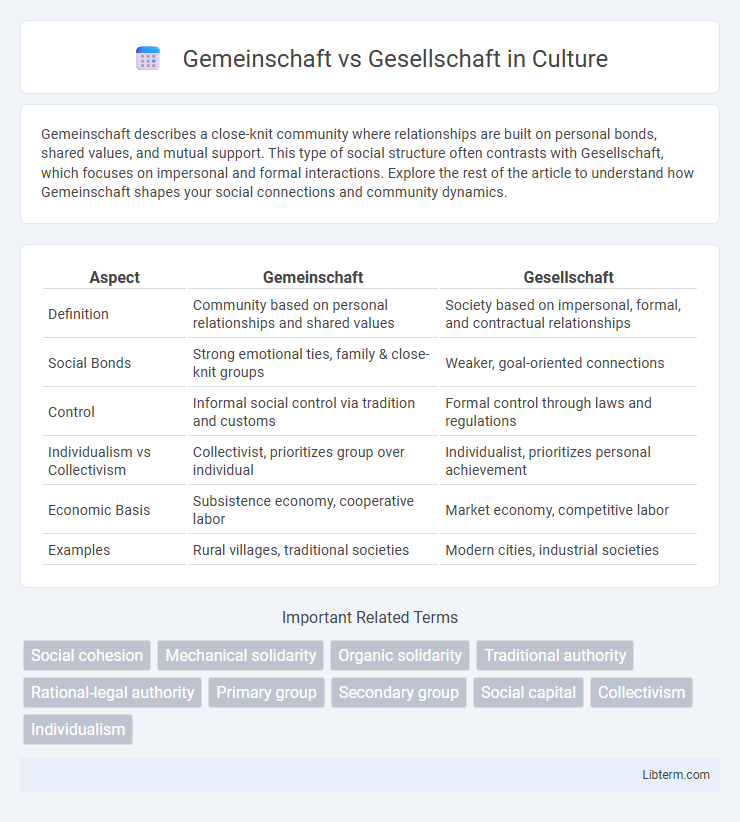Gemeinschaft describes a close-knit community where relationships are built on personal bonds, shared values, and mutual support. This type of social structure often contrasts with Gesellschaft, which focuses on impersonal and formal interactions. Explore the rest of the article to understand how Gemeinschaft shapes your social connections and community dynamics.
Table of Comparison
| Aspect | Gemeinschaft | Gesellschaft |
|---|---|---|
| Definition | Community based on personal relationships and shared values | Society based on impersonal, formal, and contractual relationships |
| Social Bonds | Strong emotional ties, family & close-knit groups | Weaker, goal-oriented connections |
| Control | Informal social control via tradition and customs | Formal control through laws and regulations |
| Individualism vs Collectivism | Collectivist, prioritizes group over individual | Individualist, prioritizes personal achievement |
| Economic Basis | Subsistence economy, cooperative labor | Market economy, competitive labor |
| Examples | Rural villages, traditional societies | Modern cities, industrial societies |
Understanding Gemeinschaft and Gesellschaft
Gemeinschaft represents social relationships based on close personal bonds, often found in families and small communities where shared values and traditions create strong social cohesion. Gesellschaft refers to associations characterized by impersonal, formal, and goal-oriented interactions common in modern urban societies and large organizations. Understanding the distinction between Gemeinschaft and Gesellschaft helps analyze how social ties influence individual behavior and community structure in different social environments.
Historical Origins of the Concepts
The concepts of Gemeinschaft and Gesellschaft were introduced by German sociologist Ferdinand Tonnies in his 1887 work "Gemeinschaft und Gesellschaft," capturing the transition from traditional, community-based societies to modern, impersonal social structures. Gemeinschaft refers to social relations characterized by close-knit, personal ties and shared values rooted in rural, kinship-based communities, while Gesellschaft describes relationships driven by individual self-interest, formal roles, and contractual bonds typical of urban and industrialized societies. These categories emerged during the rapid social changes of the 19th century, reflecting the effects of industrialization, urbanization, and modernization on social cohesion and interaction.
Key Differences Between Gemeinschaft and Gesellschaft
Gemeinschaft emphasizes close-knit relationships, community bonds, and social cohesion rooted in shared values, traditions, and emotions, typical of rural or family-based societies. Gesellschaft, in contrast, is characterized by impersonal, formal, and contractual relationships driven by individual self-interest, common in modern urban and industrial societies. The key differences lie in the nature of social ties--emotional versus rational--and the basis of social order, with Gemeinschaft relying on collective conscience and Gesellschaft depending on legal norms and economic transactions.
Social Bonds in Gemeinschaft Societies
Gemeinschaft societies emphasize intimate, direct social bonds characterized by strong family ties, communal cooperation, and shared values. These social bonds foster a sense of belonging and collective responsibility, essential for maintaining social cohesion in traditional communities. Emotional connections and personal relationships define social interactions, contrasting the impersonal and formal associations found in Gesellschaft societies.
Characteristics of Gesellschaft Communities
Gesellschaft communities are defined by impersonal, formal relationships and individual self-interest, where social ties are often contractual rather than emotional. These communities feature urbanization, specialization of labor, and a reliance on rationality and legal norms to regulate interactions. Members prioritize efficiency and goal achievement, reflecting modern industrial societies with weaker communal bonds.
Impact on Identity and Belonging
Gemeinschaft, characterized by close-knit, personal relationships typical of traditional societies, fosters strong collective identity and a deep sense of belonging through shared values and communal support. Gesellschaft, marked by impersonal, formal associations common in modern urban settings, often leads to fragmented identities and weaker social bonds due to individualism and transactional interactions. The shift from Gemeinschaft to Gesellschaft reflects changing social dynamics that influence how individuals perceive themselves and connect with their communities.
Role in Modern Urban and Rural Settings
Gemeinschaft emphasizes close-knit, personal relationships typical of rural communities with shared values and strong social cohesion, fostering trust and mutual support among members. Gesellschaft characterizes modern urban settings where relationships are more impersonal, formal, and goal-oriented, driven by individualism and institutional roles. Understanding these distinctions helps analyze social dynamics, community engagement, and identity in contemporary society.
Examples from Contemporary Society
Gemeinschaft relationships are evident in close-knit rural communities where social bonds are personal, direct, and based on shared values, such as Amish villages emphasizing tradition and mutual support. Gesellschaft is exemplified by urban societies like New York City, where interactions are impersonal, contract-based, and driven by individual goals and economic transactions. The rise of online platforms like LinkedIn also reflects Gesellschaft's emphasis on formal associations and networks formed for professional advancement rather than emotional connections.
Challenges in Transitioning Between the Two
Transitioning from Gemeinschaft (community) to Gesellschaft (society) presents challenges such as weakening social bonds and increased individualism, leading to diminished collective responsibility. The shift often results in complexities in maintaining trust and social cohesion, as interactions become more impersonal and goal-oriented. This transformation demands new frameworks for cooperation and governance to address the fragmentation of traditional community values.
Implications for Future Social Development
Gemeinschaft, characterized by close-knit, personal relationships, fosters strong community bonds and social cohesion essential for sustainable development in increasingly digital societies. Gesellschaft, defined by impersonal, contractual associations, supports innovation and economic growth but risks social fragmentation if unchecked by communal values. Balancing these social structures is critical for future social development, ensuring technological advancement does not erode the foundational sense of belonging and collective responsibility.
Gemeinschaft Infographic

 libterm.com
libterm.com